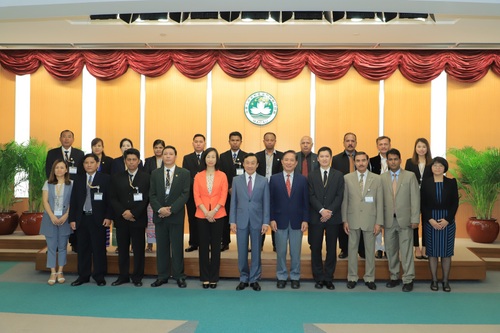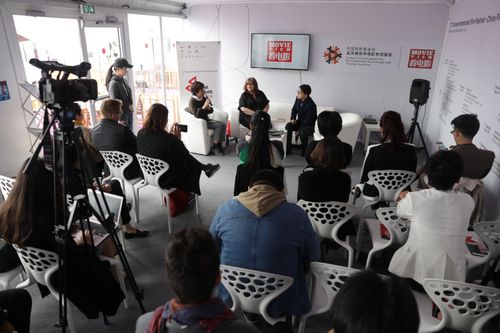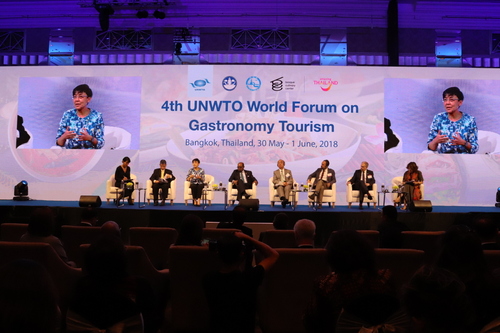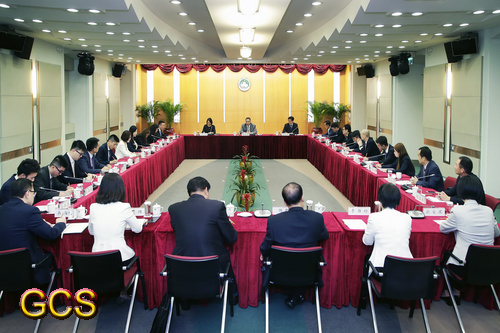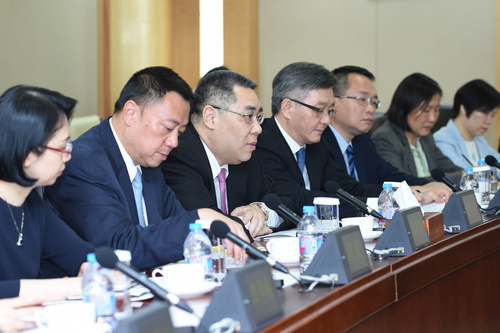Macao SAR Government Portal
News
IFT Global Centre for Tourism Education and Training & UNWTO join hands again to hold “Capacity Building for Destination Marketing & Tourism Development” training programme
On 24 to 31 May, the Institute for Tourism Studies’ (IFT) Global Centre for Tourism Education and Training (hereafter the Centre) organised an eight-day training programme titled “Capacity Building for Destination Marketing & Tourism Development”. It is the fifth time of training held by the Centre and United Nations World Tourism Organization (UNWTO). A group of 19 representatives from “One Belt, One Road” countries namely Republic of the Union of Myanmar, Islamic Republic of Pakistan and Mainland China, as well as Macao SAR and UNWTO participated in the programme.
…
External merchandise trade statistics for April 2018
Information from the Statistics and Census Service (DSEC) indicated that total merchandise export for April 2018 amounted to MOP1.09 billion, up by 30.2% year-on-year; value of re-exports (MOP955 million) increased by 38.0%, with that of Articles for casino rising by 370.4%; meanwhile, value of domestic exports (MOP137 million) slid by 6.6%, with that of Copper & articles thereof decreasing by 22.4%. Total merchandise import rose by 25.9% year-on-year to MOP6.75 billion, of which imports of Mobile phones, Beauty, cosmetic & skin-care products and Handbags & wallets expanded by 172.4%, 60.1% and 50.5% respectively. Merchandise trade deficit in April amounted to MOP5.66 billion.
…
Exhibition “Marc Chagall, Light and Colour in Southern France” by Macao Museum of Art opens on 31 May
Organized by the Macao Museum of Art (MAM), under the auspices of the Cultural Affairs Bureau, and co-organized by the Macao Government Tourism Office and the Macao Foundation, the exhibition “Marc Chagall, Light and Colour in Southern France”, will be inaugurated on Thursday, 31 May, at 6:30pm, on the 1st floor of the MAM. The exhibition features over 100 works by Marc Chagall created between the 1950s and the 1970s, including paintings, gouaches, lithographs, costumes and tapestries, showing the artist’s extraordinary creative abilities in using different means of expression. Bringing for the first time to Macao the works of one of the greatest French artists of the 20th century, the exhibition is one of the highlights of the 29th Macao Arts Festival and of the 2018 Le French May. The exhibition is open to the general public.
…
Macao Film X Tourism step into the 71st Cannes Film Festival
The 3rd International Film Festival & Awards‧Macao (IFFAM) will be staged from 8th to 14th December this year. With the aim to further enhance Macao’s reputation in the international film industry as well as to boost Macao tourism development, the Macao Government Tourism Office (MGTO) supported local film director Tracy Choi to take her movie “Sisterhood” to participate in activities in tandem with the Cannes Film Festival. During the Festival, Tracy Choi attended different exchange sessions where she met and exchanged ideas with international professional filmmakers, venturing into the global film industry and showcasing Macao as an ideal backdrop for films.
…
MGTO attends 4th UNWTO World Forum on Gastronomy Tourism in Bangkok
Macao Government Tourism Office (MGTO) is attending the 4th World Tourism Organization (UNWTO) World Forum on Gastronomy Tourism that opened today (May 30) in Bangkok, Thailand. Gathering leading experts in tourism and gastronomy from around the world, this year’s edition specially focuses on harnessing the power of technology as a driver for the sustainable growth of gastronomy tourism. MGTO Director, Maria Helena de Senna Fernandes, is one of the guest speakers of the event, this year held in Asia for the first time.
…
Macao Artists Promotion Project Ambrose So Shu Fai’s Calligraphy Exhibition “Reflections of Macao” opens soon
As part of The Macao Foundation’s Macao Artists Promotion Project, the exhibition of “Calligraphy by Ambrose So Shu Fai – Reflections of Macao” will open on Friday 1 June 2018 at 6:30 pm at the exhibition gallery of the Civic and Municipal Affairs Bureau. Over 40 pieces of works by Macao’s renowned calligrapher Ambrose So, written in oracle bone script, seal script, clerical script and running script, as well as from inscriptions on bamboo and wooden slips, will be exhibited. The book Reflections of Macao – Collection of calligraphy by Ambrose So Shu Fai will also be launched at the opening ceremony.
…
MICE statistics for the 1st quarter of 2018
Information from the Statistics and Census Service (DSEC) indicated that a total of 328 MICE events were held in the first quarter of 2018, including 314 meetings & conferences, 10 exhibitions and 4 incentives. Total number of participants and attendees was 278,000.
…
Package tours and hotel occupancy rate for April 2018
Information from the Statistics and Census Service (DSEC) indicated that visitors on package tours totalled 757,000 in April 2018, up by 12.9% year-on-year and 6.2% month-to-month. Package tour visitors from Mainland China (596,000) and the Republic of Korea (50,000) grew by 12.2% and 27.8% respectively year-on-year, while those from Taiwan (53,000) surged by 57.5%. In the first four months of 2018, visitors on package tours totalled 2,885,000, up by 20.1% year-on-year.
…
CE exploring during Beijing visit customs clearance optimisation
The SAR Government is exploring with mainland authorities ways of increasing the efficiency of the customs clearance process, in order to accommodate the greater movement of goods and higher frequency of people-to-people exchanges envisaged under the Guangdong-Hong Kong-Macao Greater Bay Area.
…


